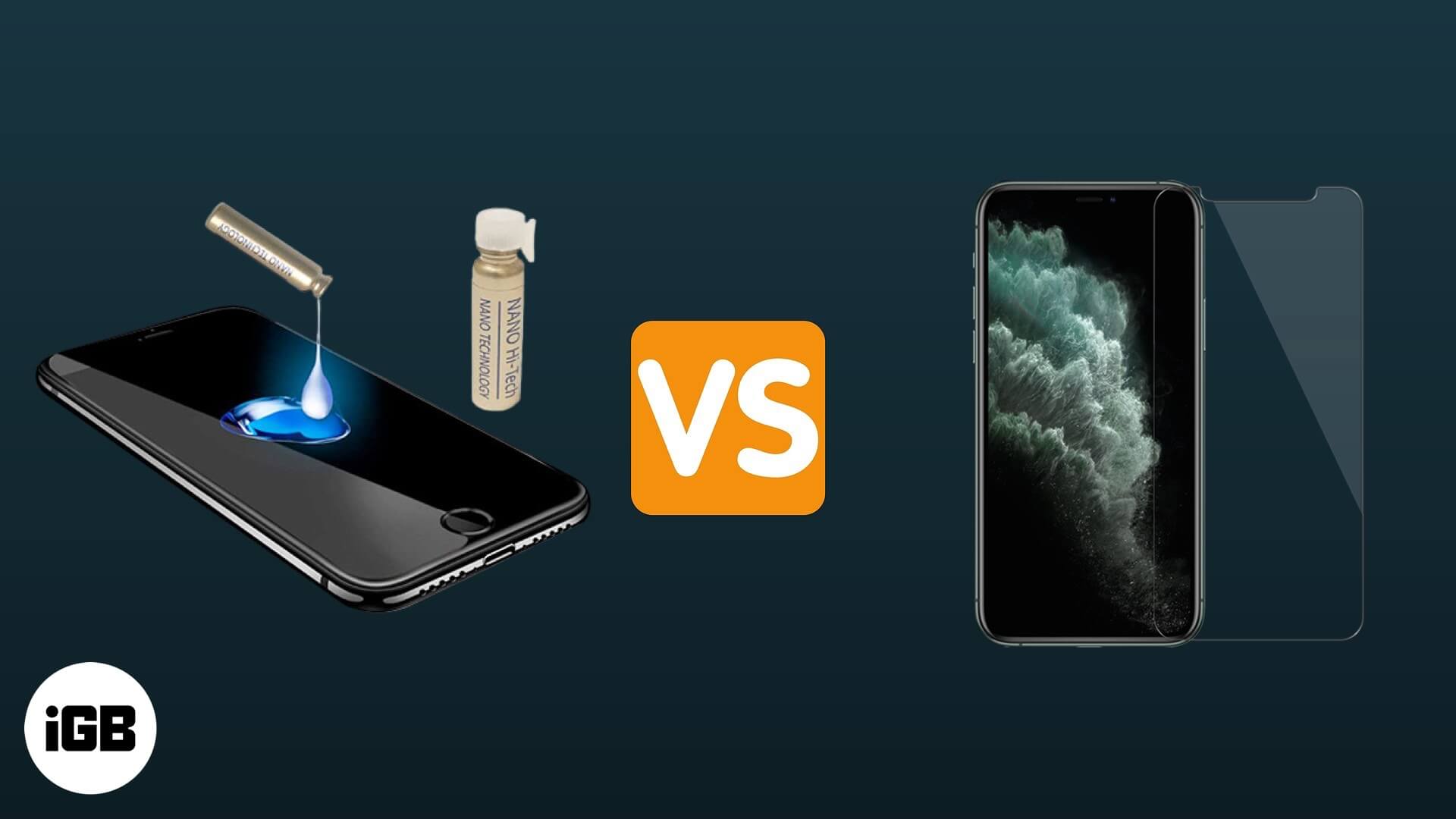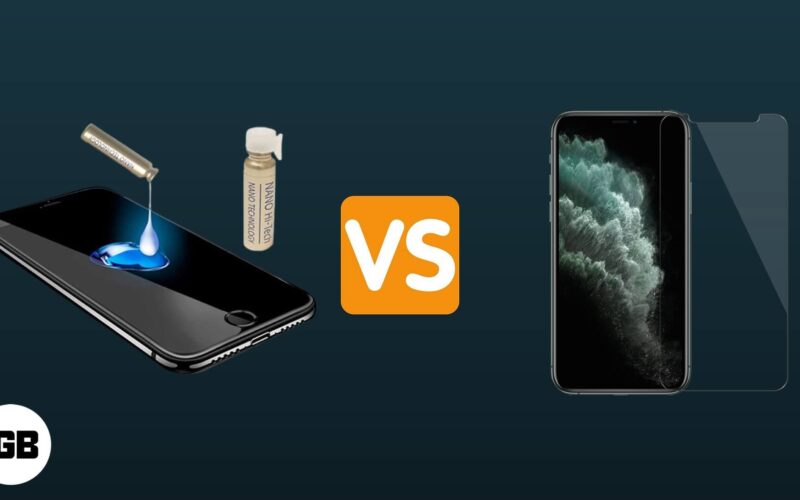As the popularity of smartphones has grown, so too has the market for screen protectors. From old plastic films to high-tech tempered glass, anti-spy, and liquid screen guards, there’s a lot of variety to choose from.

If you’ve wondered, “what kind of screen protector should I get for my phone?”, this article is for you.
Here’s everything you need to know about the differences between a liquid screen protector vs. tempered glass, and which is the best form of defense against scratches, smudges, and cracks.
Liquid screen protector vs. tempered glass: Comparison
Tempered glass is a thin sheet of toughened, fortified glass that sticks to your phone screen to protect against damage such as scratches or cracks.
Liquid screen protectors consist of a bottom layer of absorbent silicon, combined with a PET film and oleophobic coating on the top.
Tempered glass is about five times stronger than regular glass. It boasts 9H hardness which can withstand scratches from objects as sharp as a knife.
A liquid screen protector consists of nano liquid technology and is basically liquified glass. It sets into a hard coating when applied to your display. The transparent oleophobic layer fends off scratches and smudges.
Moreover, it can be used on any type of phone or other device such as the Apple Watch. So, unlike tempered glass, you don’t need to get any specific size for your phone.
Which is easier to apply?
Tempered Glass: A tempered glass screen protector can be tricky to apply. If it’s not done correctly, air bubbles or smudges can form on your screen. However, many of the latest tempered glass covers come with easy-application kits and instructions that help you out. The curved edges allow for bubble-free installation.
Liquid Screen Protector: A liquid protector, on the other hand, is more straightforward to apply with the dropper and cloth provided in the package. Simply clean your screen, apply a few drops of the liquid glass, and then rub with the cloth provided as instructed.
Which is stronger?
Tempered Glass: Tempered glass is much stronger than liquid protectors and offers 9H hardness. It can withstand most minor drops and falls, as well as scratches from something as sharp as a knife. However, the downside is that it can shatter under severe impacts, such as a significant drop.
Liquid Screen Protector: Simply put, a liquid screen guard can’t go face to face with toughened glass when it comes to providing complete protection from impact. They may be able to withstand minor everyday scuffs but hardly offer any safety from drops and hard scratches. So it’s entirely possible to damage your phone’s screen if you’ve coated it with a liquid screen protector.
Which is more scratch-resistant?
Tempered Glass: Many high-quality tempered glasses can resist scratches from objects as sharp as knives. This is thanks to their 9H hardness. It’s good enough to protect against everyday scuffs as well as more severe damage.
Liquid Screen Protector: Although a lot of liquid protectors promise to offer 9H hardness, they can’t really stand up to the claim in the long term. Since they’re so thin, they can usually only defend against minor scratches. Anything severe will likely damage the screen.
Which is smoother?
Tempered Glass: Tempered glass undergoes a unique process during production to ensure smoothness. It retains exceptional touch sensitivity to give you an excellent user experience. When applied correctly, the tempered glass screen protector won’t interfere at all between you and your phone screen.
Liquid Screen Protector: Liquid screen protectors often feel even smoother than tempered glass. This is due largely in part to the nano liquid technology that forms an invisible layer on your screen. The super-smooth oleophobic coating safeguards against scratches, dust, fingerprints, etc.
Which has better clarity?
Tempered Glass: Tempered Glass is an HD clarity glass that ensures a crystal clear display. So it gives you an optimum viewing experience from all angles.
Liquid Screen Protector: Liquid screen protectors offer high transparency courtesy of the remarkably slim structure. You’ll have a great viewing experience, but over time, it can attract dust and fingerprint smudges. So tempered glass has a slight edge in this department.
Which is thinner and lighter?
Tempered Glass: Thanks to the latest manufacturing processes, tempered glass is sleek and lightweight. Tempered glass covers barely add any bulk to your phone.
Liquid Screen Protector: Liquid screen protectors can be even more lightweight than tempered glass, and it’s hardly visible on your screen.
Which is cost-effective?
Finally, let’s consider which option is better in terms of cost. Keep in mind, this depends on your own preferences.
If your priority is to have ultra smoothness and invisible protection, a liquid screen protector would be worth it. Moreover, if you have some leftover in the pack that you buy, you can also put it on another device. Double functionality!
However, if you’re looking for reliable protection that’ll provide maximum safety to your phone, go for a tempered glass screen protector.
Further, a single pack of liquid screen protectors comes for about $25, while you can get a combo pack of three or more tempered glasses for $20 or less. So in case one cracks, you can have replacements without spending more money.
Therefore, tempered glass is more cost-effective overall. After all, it’s better to have a shattered screen protector than a shattered phone screen!
So, which one’s better?
So, now that you’ve got all the info on liquid screen protectors vs. tempered glass covers, which type of phone screen protector do you prefer? Let us know your choice in the comments below and why you picked it. We want to hear from you!
You may like to read:


